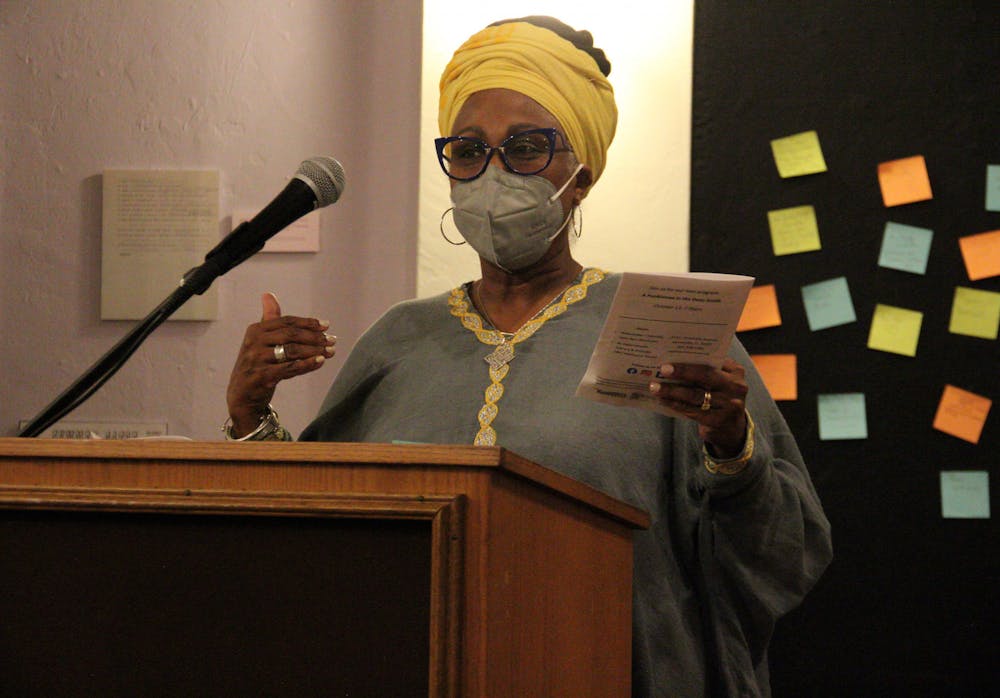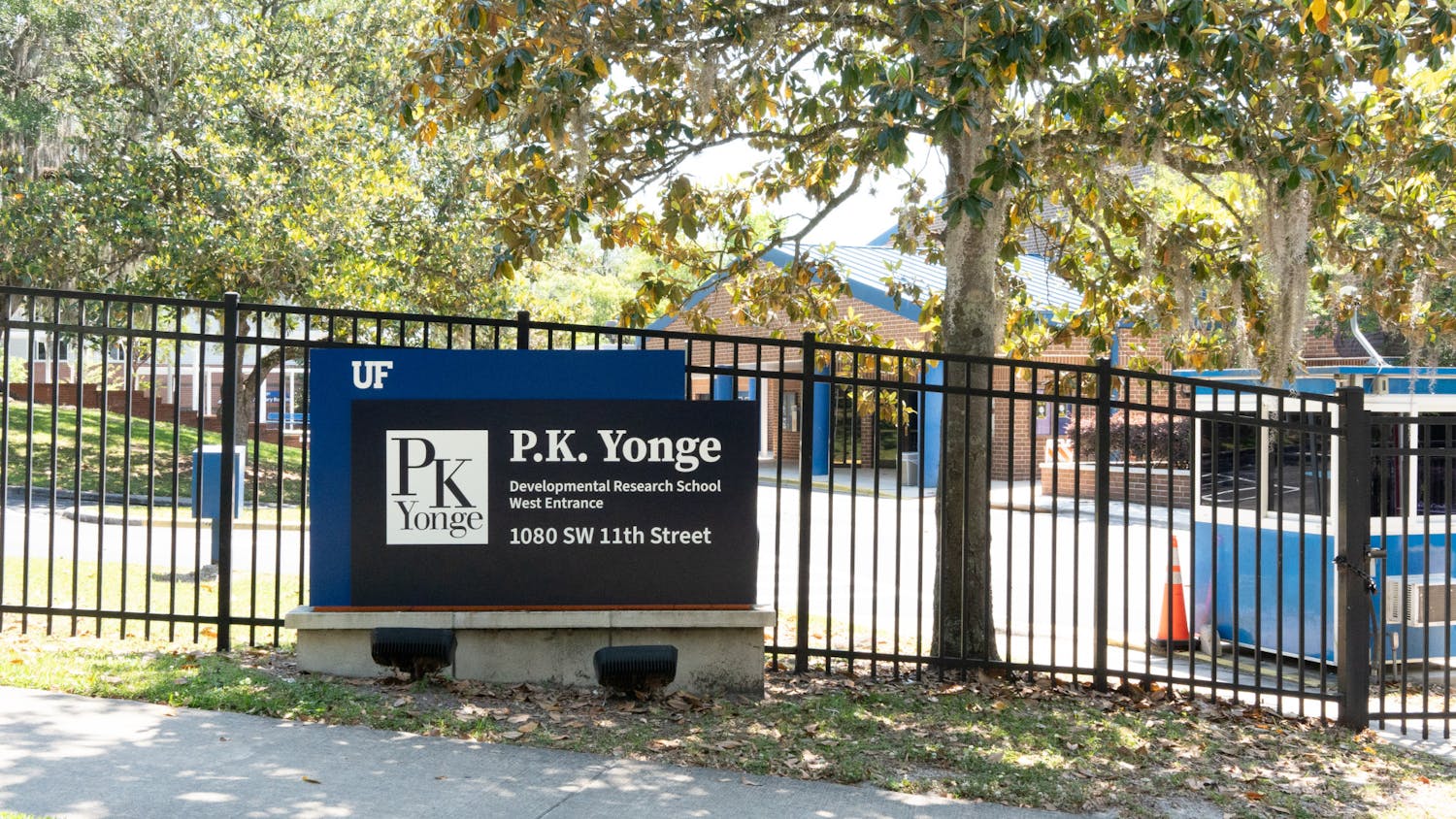Gainesville residents gathered to celebrate the life of A. Quinn Jones Sr., the first Black principal at Lincoln High School. He turned the school, now A. Quinn Jones Center, into the first accredited all-Black school in Gainesville and second in the state.
In 2017, Jones’ old home became the A. Quinn Jones Museum and Cultural Center, a historic landmark available to the public.
The museum, alongside the Matheson History Museum, hosted more than 30 in-person and 20 online attendees Sept. 23. Speakers reflected on the legacy of Gainesville schools’ desegregation and their experiences at Historically Black Colleges and Universities.
The museum hosted the event for people to learn about the history of Jones and Black education in Gainesville, said Kaitlyn Hof-Mahoney, curator of collections and acting administrator at the Matheson History Museum.
”We are celebrating the life of A. Quinn Jones, who was an educator in Gainesville, and the impact that HBCUs have on our state and communities,” she said.
Carol Richardson, Jones museum’s interim program director, used her connections to find passionate speakers for the event.
“We always want to honor the reason why the museum exists,” Richardson said. “As long as I am there, I want to always keep the legacy of the Jones family alive.”
“Prof” Jones, as he was known within the community, aimed to push his students to go into higher education. He even invested in some of them by paying for tuition to a Florida HBCU.
Many of the speakers grew up in Gainesville and were Jones’ students. Some also went to Florida’s four HBCUs, and spoke about their education and personal experiences at those schools.

Wayne Fields’ parents, Geraldine Farrar Youngblood Fields Miller and Jerry C. Miller, were influential educators in Gainesville.
His parents founded the music department at Lincoln High. The family lived nearby, and Fields would often watch the school’s band rehearsals and sporting events.
In the school’s final year, his parents put on the first musical, “Bye Bye Birdie,” at Lincoln High. It was the Millers’ greatest achievement. The star-studded cast included their son, Fields, and former City Commissioner Scherwin Henry.
Henry said that his experience in the chorus of “Bye Bye Birdie” was eye-opening.
“Mrs. Miller, in her teaching, informed us that it wasn’t all about singing,” Henry said. “But it was about posture. It was about breathing. It was about diction. It was about intonation. She wanted to make sure that as we present ourselves as a chorus, not only will people hear great music, but they will also leave with the image of a very well-taught, well-trained chorus, as well.”
John Dukes III, a 65-year-old Gainesville resident and son to longtime Gainesville educator John Dukes Jr., spoke about his father’s influence on his education. His father was the last principal at Lincoln High. He was also the first principal of Eastside High School, and the first Black Alachua County Public Schools Deputy Superintendent.
Dukes said his father was offered higher paying jobs in Arkansas and South Florida but decided to keep working in the city because Jones needed him to.
His father tried to keep Lincoln High open for as long as he could. But after the Fifth Judicial Circuit Court ruled that all segregated schools integrate or close, the school eventually had to close in November 1969.
Dukes went to J. J. Finley Elementary School, now renamed Carolyn Beatrice Parker Elementary, when he and his sister were the only Black students at the school. He graduated from the school in 1967, but he described his experience as “traumatic.”
However, he would go to the Joneses’ house for piano lessons from Jones’ wife, Frederica Jones. While he hated playing piano, he grew fond of the family.
“Those folks supported me in a way that helped me to overcome all of my objections to being in school,” Dukes said.
Dukes remembers Jones as someone he could reach out to for reassurance.
“He said, ‘Boy, all I need you to do is do your best wherever you are. You always make sure that you give more than you have to. And never be afraid to let anybody know how good you are,’” he said.
Desta Meghoo, a 62-year-old UF Levin College of Law doctoral graduate currently working in Ethiopia, spoke about the connection between HBCUs and African culture.
Meghoo has 10 children, many of whom went to various HBCUs around the country, including Bethune-Cookman University and Florida A&M University.
“It was very important for them to have an HBCU experience in order to be prepared to continue the legacy,” Meghoo said. “'I’m really, really thrilled that they not only got that education, but were able to pull great skills and reined in a sense of self and purpose through the process.”
The link between Africa and the diaspora of people of African descent across continents is very important, Meghoo said.
“We are the same people regardless of land and sea that may separate us,” she said. “This is DNA.”
Lizzie Jenkins, an 82-year-old Archer resident, remembers a time where Black grade-school education in Gainesville felt like a tight-knit family. Even though the schools were segregated and Black schools had to fight for state-recognized accreditation, the students and families involved in the schools had each other to get through those difficult times.
Jenkins graduated from Lincoln High in 1957 and went to Florida Memorial College before it became a university.
“Going to a Black school was the best thing that ever happened to me,” Jenkins said. “All of us that attended these Black institutions were [treated as] first-class citizens. And I still support my college.”
Contact Jiselle Lee at jlee@alligator.org or follow her on Twitter @jiselle_lee.
Jiselle Lee was The Alligator’s Summer 2023 Editor-In-Chief. She was previously a reporter with NextShark News and a reporting intern at The Bradenton Herald.






